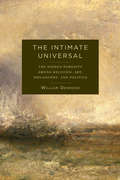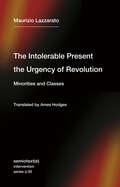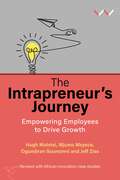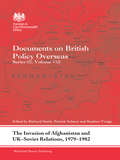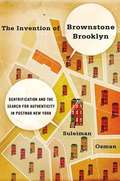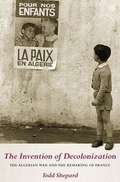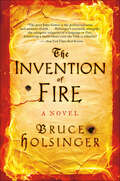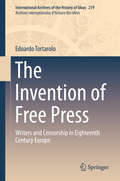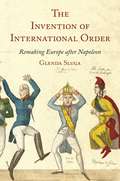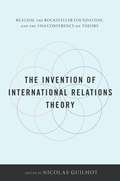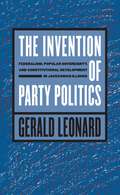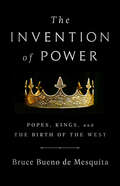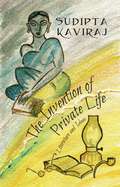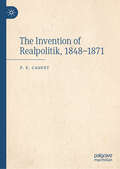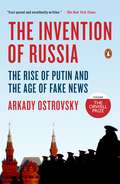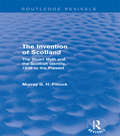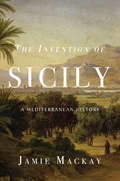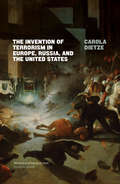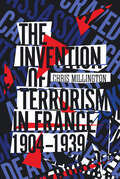- Table View
- List View
The Intimate State: Love-Marriage and the Law in Delhi (Critical Asian Studies)
by Perveez ModyThis book provides an ethnography of love-marriages in the late 1990s in Delhi, identifying the ways in which marriage is ever more a pitch of intense political contestation. It bears upon anthropological understandings of marriageability, urban morality, gender, kinship and the study of the individual and the couple in contemporary India.
The Intimate Universal: The Hidden Porosity Among Religion, Art, Philosophy, and Politics (Insurrections: Critical Studies in Religion, Politics, and Culture)
by William DesmondWilliam Desmond sees religion, art, philosophy, and politics as essential and distinctive modes of human practice, manifestations of an intimate universality that illuminates individual and social being. They are also surprisingly permeable phenomena, and by observing their relations, Desmond captures notes of a clandestine conversation that transforms ontology.
The Intimidation Game: How the Left Is Silencing Free Speech
by Kimberley StrasselFrom Kim Strassel-one of the preeminent political columnists writing today and member of the Wall Street Journal editorial board-comes an insightful, alarming look at how the Left, once the champion of civil liberties, is today orchestrating a coordinated campaign to bully Americans out of free speech. For nearly 40 years, Washington and much of the American public have held up disclosure and campaign finance laws as ideals, and the path to cleaner and freer elections. This book will show, through first-hand accounts, how both have been hijacked by the Left as weapons against free speech and free association, becoming the most powerful tools of those intent on silencing their political opposition. THE INTIMIDATION GAME provides a chilling expose of political scare tactics and overreach, including:How Citizens United set off a wave of liberal harassment against conservative politiciansThe targeting of Tea Party groups by the IRSHow Wisconsin prosecutors, state AGs, and a Democratic Congress shut down political activists and businessesThe politicization by the Obama administration of a host of government agencies including the FEC, FCC and the SECTimed to arrive at the height of the 2016 presidential season, THE INTIMIDATION GAME will shine a much-needed light on how liberal governance and the Democratic machine bullies the political process.
The Intolerable Present, the Urgency of Revolution: Minorities and Classes
by Maurizio LazzaratoAn acute reappraisal for our time of the very concept of revolution.In order to be effective, union struggles, struggles for national liberation, worker mutualism, or struggles for emancipation were strategies that were necessarily connected to revolution. Starting from the historic defeat of the global Revolution in the mid-1970s, this book draws a portrait—whose elaboration is still lacking—of the concept of revolution. What conditions could lead us to speak of revolution once again?In The Intolerable Present, the Urgency of Revolution, Maurizio Lazzarato ponders the fundamental importance of the passage from the historical class struggle (the conflict between capital and labor) to the more recent class struggles that open onto plural trajectories: social, sexual, gender, and race struggles. Expanding the notion of class as a rejoinder to the normative appropriation of minority politics, the revolution is returned as the horizon where subjection can be resorbed.In this sense, Marxist, feminist, anticolonial, and postcolonial theories provide the necessary critical tools to understand the relations between classes and minorities, between the global North and the global South, and between the time of revolutions and the eruption of new subjectivities.
The Intrapreneur’s Journey: Empowering Employees to Drive Growth
by Hugh Molotsi Mjumo Mzyece Ogundiran Soumonni Jeff ZiasAn essential business guide on how to develop an organization's innovation culture and internal entrepreneurs (intrapreneurs)The Intrapreneur’s Journey: Empowering Employees to Drive Growth is an essential guide on effectively creating and implementing a sustainable culture of innovation and entrepreneurship within organizations. The book is based on the insight that established organizations see continuous delivery of innovative products, services and processes when they enable teams of entrepreneurial employees to think and behave like start-ups.Three qualities make this book unique. First, it explores the theory and practice of intrapreneurship and innovation with a particular, but not exclusive focus on key issues in African contexts. Second, it includes a large, diverse set of instructive examples and case studies of intrapreneurship and innovation in organizations in Africa. And third, it features a useful toolkit: the Intrapreneurship Empowerment Model, a simple yet complete implementation framework. The book includes key resources of practical, real-world tools and assets used by some of the world’s most intrapreneurial and innovative organizations.The Intrapreneur’s Journey adds value for both practitioners and scholars of intrapreneurship and innovation in Africa and other parts of the world.
The Introduction of e-Government in Switzerland: Many Sparks, No Fire
by Tereza CahlikovaThis book studies the question of e-Government development from a multi-faceted perceptive. The first introductory chapter outlines the importance of public sector digitalisation. The second chapter clarifies the used e-Government terminology and divides the concept between electronic public service delivery and electronic practice of democracy. Influential factors having an impact on the introduction of e-Government projects are divided between those of organisational, institutional, individual and technological nature and discussed in detail in the third chapter. The fourth chapter presents empirical findings from the Swiss case study that constitutes both an exceptional and exemplary model of e-Government development. High quality of public services and the participative style of democracy would seem to predestine the country to be the precursor in the field of e-Government. However, the state of e-Government development does not correspond to the potential that Swiss contextual conditions offer. The importance of the Swiss case study for the understanding of e-Government as an institutional and organisational transformation is outlined in the fifth chapter.
The Invasion of Afghanistan and UK-Soviet Relations, 1979-1982: Documents on British Policy Overseas, Series III, Volume VIII (Whitehall Histories)
by R. A. Smith P. Salmon S. TwiggeThis volume examines British policy towards the Soviet Union in the aftermath of the invasion of Afghanistan in December 1979. The documents in this volume, many released into the public realm for the first time, describe the development of British policy towards the Soviet Union during the eventful years 1979-1982. The new Conservative government, under Margaret Thatcher, was determined to strengthen British defences against the perceived Soviet threat and advocated a strong response to the Soviet intervention. East-West relations further deteriorated following the imposition of martial law in Poland in December 1981. The dilemma facing the British government was how to express strong disapproval of Soviet actions while still attempting to maintain a constructive bilateral relationship, and at the same time keep British policy in line with the Western Alliance. The death of President Brezhnev in November 1982, after 18 years in office, brought uncertainty but also new opportunities for relations with the Soviets. This book will be of much interest to students of British politics and foreign policy, Russian history, US foreign policy, Central Asian politics, and IR in general.
The Invention of Brownstone Brooklyn: Gentrification and the Search for Authenticity in Postwar New York
by Suleiman OsmanThis book describes the gentrification of northwestern Brooklyn from about the 1950s to the 1970s.
The Invention of Decolonization: The Algerian War and the Remaking Of France
by Todd ShepardIn this account of the Algerian War's effect on French political structures and notions of national identity, Todd Shepard asserts that the separation of Algeria from France was truly a revolutionary event with lasting consequences for French social and political life.
The Invention of Fire: A Novel
by Bruce HolsingerThe author of the acclaimed medieval mystery A Burnable Book once again brings fourteenth-century London alive in all its color and detail in this riveting thriller featuring medieval poet and fixer John Gower—a twisty tale rife with intrigue, danger mystery, and murder.Though he is one of England’s most acclaimed intellectuals, John Gower is no stranger to London’s wretched slums and dark corners, and he knows how to trade on the secrets of the kingdom’s most powerful men. When the bodies of sixteen unknown men are found in a privy, the Sheriff of London seeks Gower’s help. The men’s wounds—ragged holes created by an unknown object—are unlike anything the sheriff’s men have ever seen. Tossed into the sewer, the bodies were meant to be found. Gower believes the men may have been used in an experiment—a test for a fearsome new war weapon his informants call the “handgonne,” claiming it will be the “future of death” if its design can be perfected.Propelled by questions of his own, Gower turns to courtier and civil servant Geoffrey Chaucer, who is working on some poems about pilgrims that Gower finds rather vulgar. Chaucer thinks he just may know who commissioned this new weapon, an extremely valuable piece of information that some will pay a high price for—and others will kill to conceal. . .
The Invention of Free Press
by Edoardo TortaroloTracking the relationship between the theory of press control and the realities of practicing daily press censorship prior to publication, this volume on the suppression of dissent in early modern Europe tackles a topic with many elusive and under-researched characteristics. Pre-publication censorship was common in absolutist regimes in Catholic and Protestant countries alike, but how effective it was in practice remains open to debate. The Netherlands and England, where critical content segued into outright lampoonery, were unusual for hard-wired press freedoms that arose, respectively, from a highly competitive publishing industry and highly decentralized political institutions. These nations remained extraordinary exceptions to a rule that, for example in France, did not end until the revolution of 1789. Here, the author's European perspective provides a survey of the varying censorship regulations in European nations, as well as the shifting meanings of 'freedom of the press'. The analysis opens up fascinating insights, afforded by careful reading of primary archival sources, into the reactions of censors confronted with manuscripts by authors seeking permission to publish. Tortarolo sets the opinions on censorship of well-known writers, including Voltaire and Montesquieu, alongside the commentary of anonymous censors, allowing us to revisit some common views of eighteenth-century history. How far did these writers, their reasoning stiffened by Enlightenment values, promote dissident views of absolutist monarchies in Europe, and what insights did governments gain from censors' reports into the social tensions brewing under their rule? These questions will excite dedicated researchers, graduate students, and discerning lay readers alike.
The Invention of Humanity: Equality and Cultural Difference in World History
by Siep StuurmanFor much of history, strangers were seen as barbarians, seldom as fellow human beings. The notion of common humanity had to be invented. Drawing on global thinkers, Siep Stuurman traces ideas of equality and difference across continents and civilizations, from antiquity to present-day debates about human rights and the “clash of civilizations.”
The Invention of International Order: Remaking Europe after Napoleon
by Professor Glenda SlugaThe story of the women, financiers, and other unsung figures who helped to shape the post-Napoleonic global orderIn 1814, after decades of continental conflict, an alliance of European empires captured Paris and exiled Napoleon Bonaparte, defeating French military expansionism and establishing the Concert of Europe. This new coalition planted the seeds for today's international order, wedding the idea of a durable peace to multilateralism, diplomacy, philanthropy, and rights, and making Europe its center. Glenda Sluga reveals how at the end of the Napoleonic wars, new conceptions of the politics between states were the work not only of European statesmen but also of politically ambitious aristocratic and bourgeois men and women who seized the moment at an extraordinary crossroads in history.In this panoramic book, Sluga reinvents the study of international politics, its limitations, and its potential. She offers multifaceted portraits of the leading statesmen of the age, such as Tsar Alexander, Count Metternich, and Viscount Castlereagh, showing how they operated in the context of social networks often presided over by influential women, even as they entrenched politics as a masculine endeavor. In this history, figures such as Madame de Staël and Countess Dorothea Lieven insist on shaping the political transformations underway, while bankers influence economic developments and their families agitate for Jewish rights.Monumental in scope, this groundbreaking book chronicles the European women and men who embraced the promise of a new kind of politics in the aftermath of the Napoleonic wars, and whose often paradoxical contributions to modern diplomacy and international politics still resonate today.
The Invention of International Relations Theory: Realism, the Rockefeller Foundation, and the 1954 Conference on Theory
by Nicolas GuilhotThe 1954 Conference on Theory, sponsored by the Rockefeller Foundation, featured a who's who of scholars and practitioners debating the foundations of international relations theory. Assembling his own team of experts, all of whom have struggled with this legacy, Nicolas Guilhot revisits a seminal event and its odd rejection of scientific rationalism.Far from being a spontaneous development, these essays argue, the emergence of a "realist" approach to international politics, later codified at the conference, was deliberately triggered by the Rockefeller Foundation. The organization was an early advocate of scholars who opposed the idea of a "science" of politics, pursuing, for the sake of disciplinary autonomy, a vision of politics as a prerational and existential dimension that could not be "solved" by scientific means. As a result, this nascent theory was more a rejection of behavioral social science than the birth of one of its specialized branches. The archived conversations reproduced here, along with unpublished papers by Hans Morgenthau, Reinhold Niebuhr, and Paul Nitze, speak to this defensive stance. International relations theory is critically linked to the context of postwar liberalism, and the contributors explore how these origins have played out in political thought and American foreign policy.
The Invention of Market Freedom
by Eric MacgilvrayHow did the value of freedom become so closely associated with the institution of the market? Why did the idea of market freedom hold so little appeal before the modern period and how can we explain its rise to dominance? In The Invention of Market Freedom, Eric MacGilvray addresses these questions by contrasting the market conception of freedom with the republican view that it displaced. After analyzing the ethical core and exploring the conceptual complexity of republican freedom, MacGilvray shows how this way of thinking was confronted with, altered in response to, and finally overcome by the rise of modern market societies. By learning to see market freedom as something that was invented, we can become more alert to the ways in which the appeal to freedom shapes and distorts our thinking about politics.
The Invention of Party Politics
by Gerald LeonardThis ambitious work uncovers the constitutional foundations of that most essential institution of modern democracy, the political party. Taking on Richard Hofstadter's classic The Idea of a Party System, it rejects the standard view that Martin Van Buren and other Jacksonian politicians had the idea of a modern party system in mind when they built the original Democratic party.Grounded in an original retelling of Illinois politics of the 1820s and 1830s, the book also includes chapters that connect the state-level narrative to national history, from the birth of the Constitution to the Dred Scott case. In this reinterpretation, Jacksonian party-builders no longer anticipate twentieth-century political assumptions but draw on eighteenth-century constitutional theory to justify a party division between "the democracy" and "the aristocracy." Illinois is no longer a frontier latecomer to democratic party organization but a laboratory in which politicians use Van Buren's version of the Constitution, states' rights, and popular sovereignty to reeducate a people who had traditionally opposed party organization. The modern two-party system is no longer firmly in place by 1840. Instead, the system remains captive to the constitutional commitments on which the Democrats and Whigs founded themselves, even as the specter of sectional crisis haunts the parties' constitutional visions.
The Invention of Power: Popes, Kings, and the Birth of the West
by Bruce Bueno de MesquitaIn the tradition of Why Nations Fail, this book solves one of the great puzzles of history: Why did the West become the most powerful civilization in the world?Western exceptionalism—the idea that European civilizations are freer, wealthier, and less violent—is a widespread and powerful political idea. It has been a source of peace and prosperity in some societies, and of ethnic cleansing and havoc in others.Yet in The Invention of Power, Bruce Bueno de Mesquita draws on his expertise in political maneuvering, deal-making, and game theory to present a revolutionary new theory of Western exceptionalism: that a single, rarely discussed event in the twelfth century changed the course of European and world history. By creating a compromise between churches and nation-states that, in effect, traded money for power and power for money, the 1122 Concordat of Worms incentivized economic growth, facilitated secularization, and improved the lot of the citizenry, all of which set European countries on a course for prosperity. In the centuries since, countries that have had a similar dynamic of competition between church and state have been consistently better off than those that have not.The Invention of Power upends conventional thinking about European culture, religion, and race and presents a persuasive new vision of world history.
The Invention of Private Life: Literature and Ideas
by Sudipta KavirajThe essays in this volume, which lie at the intersection of the study of literature, social theory, and intellectual history, locate serious reflections on modernity's complexities in the vibrant currents of modern Indian literature, particularly in the realms of fiction, poetry, and autobiography. Sudipta Kaviraj shows that Indian writers did more than adopt new literary trends in the nineteenth and twentieth centuries. They deployed these innovations to interrogate fundamental philosophical questions of modernity. Issues central to modern European social theory grew into significant themes within Indian literary reflection, such as the influence of modernity on the nature of the self, the nature of historicity, the problem of evil, the character of power under the conditions of modern history, and the experience of power as felt by an individual subject of the modern state. How does modern politics affect the personality of a sensitive individual? Is love possible between intensely self-conscious people, and how do individuals cope with the transience of affections or the fragility of social ties? Kaviraj argues that these inquiries inform the heart of modern Indian literary tradition and that writers, such as Bankimchandra Chattopadhyay, Rabindranath Tagore, and Sibnath Sastri, performed immeasurably important work helping readers to think through the predicament of modern times.
The Invention of Realpolitik, 1848–1871
by P. E. CaquetWhat is Realpolitik? How did the concept come about, and what does it stand for? This book explores the origins and meaning of a core precept of international history and politics. Statesmen, diplomats, and analysts alike deploy the term as if it were a timeless label. Endlessly, they suppose, states compete with each other for power in a zero-sum game. Yet Realpolitik was born in Germany in the mid-nineteenth century. The circumstances of its birth are key to its meaning. Realpolitik emerged among Europe’s constitutional struggles on the one hand, and the wars of Italian and German unification on the other. Revolutionary disappointment, the end of the Romantic era, and the rise of a new scientific materialism all informed a Realist period of political strongmen. Rather than describing a permanent state of things, this book suggests, Realpolitik is rooted in nineteenth-century European and German politics, and consequently the rise of an aggressive nationalism.
The Invention of Religion in Japan (Elecronic Resource Ser.)
by Jason Ananda JosephsonThroughout its long history, Japan had no concept of what we call OC religion. OCO There was no corresponding Japanese word, nor anything close to its meaning. But when American warships appeared off the coast of Japan in 1853 and forced the Japanese government to sign treaties demanding, among other things, freedom of religion, the country had to contend with this Western idea. In this book, Jason Ananda Josephson reveals how Japanese officials invented religion in Japan and traces the sweeping intellectual, legal, and cultural changes that followed. aMore than a tale of oppression or hegemony, JosephsonOCOs account demonstrates that the process of articulating religion offered the Japanese state a valuable opportunity. In addition to carving out space for belief in Christianity and certain forms of Buddhism, Japanese officials excluded Shinto from the category. Instead, they enshrined it as a national ideology while relegating the popular practices of indigenous shamans and female mediums to the category of OC superstitionsOCOOCoand thus beyond the sphere of tolerance. Josephson argues that the invention of religion in Japan was a politically charged, boundary-drawing exercise that not only extensively reclassified the inherited materials of Buddhism, Confucianism, and Shinto to lasting effect, but also reshaped, in subtle but significant ways, our own formulation of the concept of religion today. This ambitious and wide-ranging book contributes an important perspective to broader debates on the nature of religion, the secular, science, and superstition.
The Invention of Russia: The Rise of Putin and the Age of Fake News
by Arkady OstrovskyWINNER OF THE 2016 ORWELL PRIZEFINANCIAL TIMES BOOK OF THE YEARA highly original narrative history by The Economist's Moscow bureau chief that does for modern Russia what Evan Osnos did for China in Age of Ambition The end of communism and breakup of the Soviet Union was a time of euphoria around the world, but Russia today is violently anti-American and dangerously nationalistic. So how did we go from the promise of those heady days to the autocratic police state of Putin's new Russia? The Invention of Russia is a breathtakingly ambitious book that reaches back to the darkest days of the cold war to tell the story of the fight for the soul of a nation. With the deep insight only possible of a native son, Ostrovsky introduces us to the propagandists, oligarchs, and fixers who have set Russia's course since the collapse of the Soviet Union, inventing a new and more ominous identity for a country where ideas are all too often wielded like a cudgel. The Soviet Union yoked together dreamers and strongmen--those who believed in an egalitarian ideal and those who pushed for an even more powerful state. The new Russia is a cynical operation, where perpetual fear and war are fueled by a web of lies, as television presenters peddle the invasion of Ukraine and goad Putin to go nuclear. Twenty-five years after the Soviet flag came down over the Kremlin, Russia and America are again heading toward a confrontation--but this course was far from inevitable. With this riveting account of how we got here--of the many mistakes and false promises--Ostrovsky emerges as Russia's most gifted chronicler.From the Hardcover edition.
The Invention of Scotland: The Stuart Myth and the Scottish Identity, 1638 to the Present (Routledge Revivals)
by Murray G. PittockA dynasty of high ability and great charm, the Stuarts exerted a compelling fascination over their supporters and enemies alike. First published in 1991, this title assesses the influence of the Stuart mystique on the modern political and cultural identity of Scotland. Murray Pittock traces the Stuart myth from the days of Charles I to the modern Scottish National Party, and discusses both pro- and anti-Union propaganda. He provides a unique insight into the ‘radicalism’ of Scottish Jacobitism, contrasting this ‘Jacobitisim of the Left’ with the sentimental image constructed by the Victorians. Dealing with a subject of great relevance to modern British society, this reissue provides an extensive analysis of Scottish nationhood, the Stuart cult and Jacobite ideology. It will be of great interest to students of literature, history, and Scottish culture and politics.
The Invention of Sicily: A Mediterranean History
by Jamie MackayA fascinating cultural history of this most magical of islandsSicily has always acted as a gateway between Europe and the rest of the world. Fought over by the Phoenicians and Greeks, the Romans, Goths and Byzantines, Arabs and Normans, Germans, Spanish and the French for thousands of year, Sicily became a unique melting pot where diverse traditions merged, producing a unique heritage and singular culture.In this fascinating account of the island from the earliest times to the present day, author and journalist Jamie Mackay leads us through this most elusive of places. From its pivotal position in the development of Greek and Roman mythology, and the beautiful remnants of both the Arab and Norman invasions, through to the rise of the bandits and the Cosa Nostra, The Invention of Sicily is the perfect companion to the culture and history of Sicily.Mackay weaves the political and social development of the island in with its fascinating cultural heritage - in doing so discussing how great works including Lampedusa's masterpiece The Leopard and its film adaptation by Visconti, and the novels of Leonardo Sciascia, among many others, have both been shaped by Sicily's past, and continue to shape it into the present.
The Invention of Terrorism in Europe, Russia, and the United States
by Carola DietzeTerrorism's roots in Western Europe and the USAThis book examines key cases of terrorist violence to show that the invention of terrorism was linked to the birth of modernity in Europe, Russia and the United States, rather than to Tsarist despotism in 19th century Russia or to Islam sects in Medieval Persia. Combining a highly readable historical narrative with analysis of larger issues in social and political history, the author argues that the dissemination of news about terrorist violence was at the core of a strategy that aimed for political impact on rulers as well as the general public. Dietze's lucid account also reveals how the spread of knowledge about terrorist acts was, from the outset, a transatlantic process. Two incidents form the book's centerpiece. The first is the failed attempt to assassinate French Emperor Napoléon III by Felice Orsini in 1858, in an act intended to achieve Italian unity and democracy. The second case study offers a new reading of John Brown's raid on the arsenal at Harpers Ferry in 1859, as a decisive moment in the abolitionist struggle and occurrences leading to the American Civil War. Three further examples from Germany, Russia, and the US are scrutinized to trace the development of the tactic by first imitators. With their acts of violence, the "invention" of terrorism was completed.Terrorism has existed as a tactic since then and has essentially only been adapted through the use of new technologies and methods.
The Invention of Terrorism in France, 1904-1939
by Chris MillingtonThe Invention of Terrorism in France, 1904-1939 investigates the political and social imaginaries of "terrorism" in the early twentieth century. Chris Millington traces the development of how the French conceived of terrorism, from the late nineteenth-century notion that terrorism was the deed of the mad anarchist bomber, to the fraught political clashes of the 1930s when terrorism came to be understood as a political act perpetrated against French interests by organized international movements. Through a close analysis of a series of terrorist incidents and representations thereof in public discourse and the press, the book argues that contemporary ideas of terrorism in France as "unFrench"—that is, contrary to the ideas and values, however defined, that make up "Frenchness"—emerged in the interwar years and subsequently took root long before the terrorist campaigns of Algerian nationalists during the 1950s and 1960s. Millington conceptualizes "terrorism" not only as the act itself, but also as a political and cultural construction of violence composed from a variety of discourses and deployed in particular circumstances by commentators, witnesses, and perpetrators. In doing so, he argues that the political and cultural battles inherent to perceptions of terrorism lay bare numerous concerns, not least anxieties over immigration, antiparliamentarianism, representations of gender, and the future of European peace.

